G. K. Chesterton Collection (11 vols.)
Digital Logos Edition
Overview
G. K. Chesterton was a well-known novelist, essayist, playwright, poet, and ardent apologist for the Christian faith. One of Britain’s most famous and prolific twentieth century writers, his apologetic works—such as Orthodoxy—have influenced generations of Christian belief. His historical works have made important theologians accessible to modern Christians, and his essays and commentary were influential in the conversion of C.S. Lewis. As the author of more than 80 volumes, 200 short stories, and 4,000 essays, his works combine literary wit, theological acumen, and pointed cultural critique. Together, Chesterton’s works are required reading for theologians, philosophers, and thinking Christians.
The 11-volume G. K. Chesterton Collection from Logos Bible Software assembles his most important theological and apologetic works, including Orthodoxy—Chesterton’s most well-known work—Heretics, and much more. This collection also contains volumes of essays on social trends, as well as travel writing.
- Chesterton’s Orthodoxy and Heretics—his most famous apologetic works
- All Scripture references linked to the Bibles in your library
- Ideal for pastors, students, and laity
- Title: G. K. Chesterton Collection (11 vols.)
- Author: G. K. Chesterton
- Volumes: 11
- Pages: 2,733
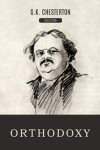
Orthodoxy
- Author: G. K. Chesterton
- Publisher: The Bodley Head
- Publication Date: 1908
- Pages: 278
Orthodoxy is Chesterton’s most well-known work. First published 100 years ago and reprinted ever since, Orthodoxy is a classic work that is part memoir, part apologetic. It exhibits Chesterton at his finest—a combination of literary wit, theological acumen, and pointed cultural critic.
Orthodoxy has become a classic, taking its place on the shelves of thinking Christians beside Augustine’s Confession and C.S. Lewis’s Mere Christianity. His goals for Orthodoxy are simple: “I have attempted in a vague and personal way, in a set of mental pictures rather than in a series of deductions, to state the philosophy in which I have come to believe. I will not call it my philosophy; for I did not make it. God and humanity made it; and it made me.” He sharply criticizes the prevailing secular understanding of truth while documenting the genesis of his own spiritual journey. Throughout, Chesterton comments on the intellectual giants of his day—H.G. Wells, Walt Whitman, Arthur Schopenhauer, and George Bernard Shaw.
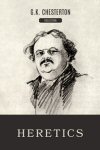
Heretics
- Author: G. K. Chesterton
- Publisher: The Bodley Head
- Publication Date: 1905
- Pages: 305
Heretics exposes the heresy of modern intellectual trends and discredits their proponents. Chesterton confronts relativism, individualism, neo-paganism, and the other ailments contributing to the decline of Western thought in the modern era. He pays special attention to artists and the literati, and writes in detail about current events which are shaped by the social consciousness of his time. Heretics begins and ends with chapters on orthodoxy, anticipating the themes Chesterton later develops on his famous volume by the same name.
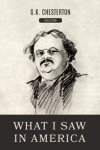
What I Saw in America
- Author: G. K. Chesterton
- Publisher: Hodder and Stoughton
- Publication Date: 1922
- Pages: 297
With the publication of What I Saw in America, Chesterton joins the ranks of Alexis de Tocqueville, Charles Dickens, and Abraham Kuyper and other prominent European literary and political figures to tour American and write about it. This volume contains dozens of reflections on American hospitality, business, politics; it concludes with three prescient essays on the spirit of America, the spirit of England, and the future of democracy.
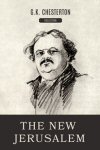
The New Jerusalem
- Author: G. K. Chesterton
- Publisher: George H. Doran Company
- Publication Date: 1921
- Pages: 307
Although Chesterton called this book “an uncomfortably large notebook,” it exhibits travel writing at its finest. This volume documents Chesterton’s travels in the Middle East. It contains vivid reflections on the history, religion, and geography of Palestine. He writes on cities, culture, and social concerns, and reflects on important social and historical topics, such as Zionism and the Crusades.
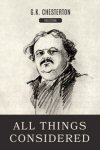
All Things Considered
- Author: G. K. Chesterton
- Publisher: Methuen & Co.
- Publication Date: 1908
- Pages: 296
Chesterton was an accomplished and noted essayist. All Things Considered is one of Chesterton’s earliest collections of essays, and deals perhaps more than any other with religious and theological topics. This volume contains thirty-five essays on spiritualism, humanitarianism, science and religion, morality, and more.
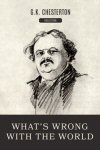
What’s Wrong With the World
- Author: G. K. Chesterton
- Publisher: Dodd, Mead and Company
- Publication Date: 1910
- Pages: 367
Taken as a whole, What’s Wrong with the World attempts to advance a conservative social view of twentieth century British affairs. Individually, these essays offer sage advice on political and cultural issues for today. This collection contains essays on feminism, education, imperialism, and more, and together amount to a pointed critique of the prevailing sociological method. The problems with the world run deep—in this volume, Chesterton assails hypocrisy and mediocrity characteristic of the modern era.
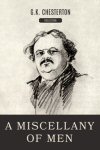
A Miscellany Of Men
- Author: G. K. Chesterton
- Publisher: Dodd, Mead and Company
- Publication Date: 1912
- Pages: 314
A Miscellany of Men contains essays on the most controversial topics of Chesterton’s day. It was written, says Chesterton, at “a time in which the liberal tradition, as I hold it, was not only dying but committing suicide.” His commentary is structured by analyzing the ranks and positions of individuals in the various strata of society. A Miscellany of Men also includes Chesterton’s oft-cited preface on the nature of human equality.
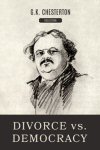
Divorce vs. Democracy
- Author: G. K. Chesterton
- Publisher: The Society of SS. Peter & Paul
- Publication Date: 1916
- Pages: 14
Chesterton’s first essay against divorce first appeared in Nash’s Magazine, and was reprinted as a stand-alone volume at the request of his readers. Divorce versus Democracy makes a case against divorce by appealing to both patriotism and to history. Chesterton argues for a Christian understanding marriage, and implores the church to stem the erosion of morality in modern Europe. This book also exhibits Chesterton’s views on the relationship between the church and state relating to issues of marriage and family life.
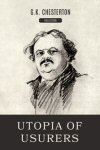
Utopia Of Usurers
- Author: G. K. Chesterton
- Publisher: Boni and Liveright
- Publication Date: 1917
- Pages: 217
Utopia of Usurers contains Chesterton’s collected writings on modern culture. It includes essays on science, eugenics, Puritanism, socialism, and church and state relations. This provocative and penetrating commentary contains a sharp critique and sage advice on the social ills of Chesterton’s time and ours.
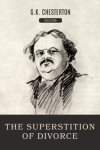
The Superstition of Divorce
- Author: G. K. Chesterton
- Publisher: John Lane Co.
- Publication Date: 1920
- Pages: 150
This compact volume provides a basic and readable introduction to the philosophy of marriage and the purpose of the family. In it, Chesterton expands and develops his arguments in Divorce versus Democracy, showing that divorce does not solve the problems of individuals; rather, it corrupts society as a whole.
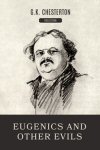
Eugenics and Other Evils
- Author: G. K. Chesterton
- Publisher: Cassel and Company
- Publication Date: 1922
- Pages: 188
Chesterton wrote during the height of the eugenics movements in the early twentieth century. This volume counters the intellectual nihilism of Nietzsche, while simultaneously rebuking Western notions of progress—biological or otherwise. Chesterton expands his criticism of eugenics into what he calls “a more general criticism of the modern craze for scientific officialism and strict social organization.”
G.K. Chesterton was born in London in 1874. He worked at the Redway and T. Fisher Unwin publishing house until 1902, when he began writing regularly—his weekly columns appeared for decades in the Daily News and The Illustrated London News. In all, he wrote more than 80 books, hundreds of poems, 200 short stories, 4,000 essays. Among his writings are his famous apologetic work Orthodoxy, a biography of St. Aquinas, his Father Brown detective stories, The Napoleon of Notting Hill, and The Man Who Was Thursday. He died on June 14, 1936 in Buckinghamshire.
Reviews
15 ratings

Forrest Cole
11/9/2021

Kevin Bratcher
6/12/2018

Charles Rabinowitz
4/16/2018


Larry Liddiard
11/28/2015

Jon P.
2/28/2015
Beh
1/29/2015

John L. Jefferson
9/10/2014
Dario Oliveira de Matos
6/4/2014
Interesting collection, although missing "The everlasting man", the Father Brown series and a handful of other titles. Nevertheless, I've just downloaded the books I want in kindle environment, as most of these titles are for free there...